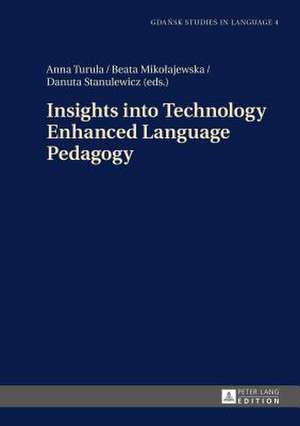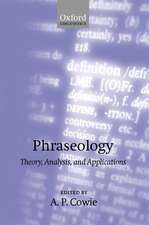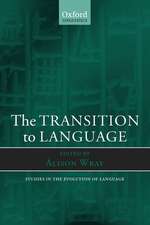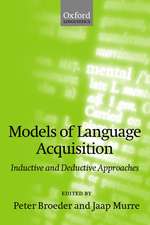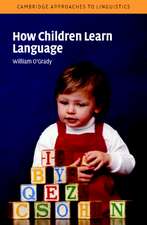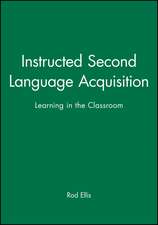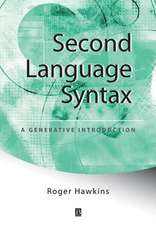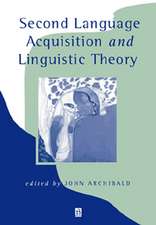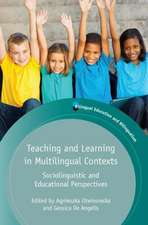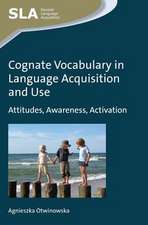Insights Into Technology Enhanced Language Pedagogy: Finanzkontrolle Von Regierung Und Verwaltung: Warsaw Studies in English Language and Literature, cartea 18
Editat de Anna Turula, Beata Mikolajewska, Danuta Stanulewiczen Limba Engleză Hardback – 10 iun 2015
Preț: 411.62 lei
Nou
Puncte Express: 617
Preț estimativ în valută:
78.76€ • 82.46$ • 65.17£
78.76€ • 82.46$ • 65.17£
Carte tipărită la comandă
Livrare economică 01-07 aprilie
Preluare comenzi: 021 569.72.76
Specificații
ISBN-13: 9783631656693
ISBN-10: 3631656696
Pagini: 197
Dimensiuni: 147 x 211 x 18 mm
Greutate: 0.36 kg
Editura: Peter Lang Gmbh, Internationaler Verlag Der W
Seria Warsaw Studies in English Language and Literature
ISBN-10: 3631656696
Pagini: 197
Dimensiuni: 147 x 211 x 18 mm
Greutate: 0.36 kg
Editura: Peter Lang Gmbh, Internationaler Verlag Der W
Seria Warsaw Studies in English Language and Literature
Notă biografică
Anna Turula holds a PhD and D. Litt. in applied linguistics. She has published three books and more than fifty articles on the affective and cognitive approaches to language learning and teaching as well as individual differences in TEFL, including a number of publications on new technologies in language learning and teacher training. She is currently based at the Pedagogical University, Cracow (Poland).
Beata Mikolajewska is a young academic who holds an MA in English and a Diploma in Culture Management. She has a wide experience in teaching pronunciation and EFL, and her interests include orthoepy, English borrowings and corpus linguistics. She has co-edited two books and published five articles.
Danuta Stanulewicz holds a Ph.D. and D. Litt. in general linguistics. Her numerous publications concern various topics in semantics as well as in sociolinguistics and language acquisition. She is employed at the Institute of English and American Studies, University of Gdansk, Poland.
Beata Mikolajewska is a young academic who holds an MA in English and a Diploma in Culture Management. She has a wide experience in teaching pronunciation and EFL, and her interests include orthoepy, English borrowings and corpus linguistics. She has co-edited two books and published five articles.
Danuta Stanulewicz holds a Ph.D. and D. Litt. in general linguistics. Her numerous publications concern various topics in semantics as well as in sociolinguistics and language acquisition. She is employed at the Institute of English and American Studies, University of Gdansk, Poland.
Cuprins
Contents: Melinda Dooly: Learning to e-function in a brave new world: Language teachers¿ roles in educating for the future ¿ Mägorzata Kurek: The potential of telecollaborative projects for teacher training programmes ¿ Anna Turula: In and between people in an online course. E-classroom dynamics and NEO-FFI personality measures ¿ W¿odzimierz Sobkowiak: Virtlantis, Facebook and Second Life: Web2 scaffolding for virtual world language learning community of practice ¿ Mariusz Kruk: CALL vs. traditional grammar instruction: The case of the past simple tense ¿ Krzysztof Kotu¿a: New technologies and classroom interaction. Computer-enhanced ludic techniques in language learning ¿ Edward Gillian: Teaching articles to ESL learners with GBL and scaffolding ¿ Marek Molenda/Piotr P¿zik: Extending the definition of confluence. A corpus-based study of advanced learners¿ spoken language ¿ El¿bieta Jendrych: Corpus studies as a prerequisite to e-materials development for business English students ¿ Agnieszka Le¿ko-Szymäska: A teacher-training course on the use of corpora in language education: Perspectives of the students ¿ Agnieszka Gadomska/Jaros¿aw Krajka: E-material writing for Polish middle school learners of English. Vocabulary strategies in multimedia-supported learning - a case study ¿ Hanna Dziczek-Karlikowska/Beata Miko¿ajewska: Computer-assisted awareness raising of L2 phonology: Pronunciation in commercials - a pilot study ¿ Agnieszka Wagner: Pronunciation training in L2 Polish using a CAPT system AzAR ¿ Kamila Burzy¿ska/Jaros¿aw Krajka: Developing university students¿ learning strategies in CALL environments.
